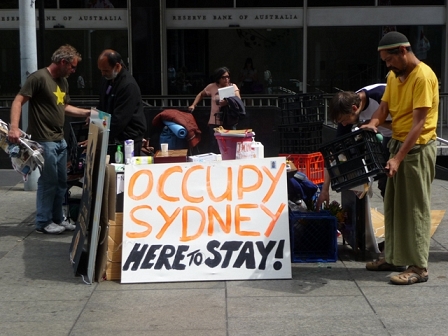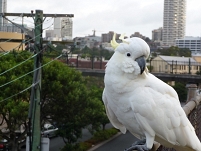Erstellt am: 15. 11. 2011 - 10:35 Uhr
Sydney Snap Shot
"There is so much shit going wrong in the world and we have finally realised who is to blame", said Patrick, "It`s the 1%. And we are here to tell them that."
He was sporting a goatee beard and a beanie and he was haggling over the price of a take-out coffee in down-town Sydney on a break from his rather quixotic quest to Occupy Sydney. "Surely the second espresso should be cheaper?"
The coffee vendor, a friendly Slovenian émigré, had originallz asked me whether we wanted to pay together or separately, mistaking me for one of Patrick's gang, probably because, to protect myself from the fierce sun, I was wearing my Cuban-style green-cap which must have given me the air of a sun-blushed revolutionary. As we walked up the new steps together to his protest 'camp´ outside the Reserve Bank on the ochre paving slabs of a pedestrian precinct called Martin Place, Patrick and I got talking about his plans for the fight for "economic justice".

christian cummins
Al Gore has called the movement that sprang out of the Occupy Wall Street protests "a primal scream of democracy" but even with the aid of Patrick's retro megaphone, this scream was muffled. It was 35 degrees under the harsh sun of the early morning and there were only eight demonstrators huddled rather despondently around a square of bill boards in front of a major bank. In freezing Colorado in the USA protestors had complained that the police had confiscated their warm clothes and hats to move them on. Here, in the searing Australian summer, Patrick said the authorities were denying them any shade by dismantling any attempts to build a make-shift parasol. He had pulled his megaphone to his lips like a conch and was railing against this injustice in a rather high-pitched voice.
If true, it seemed a rather underhand tactic to use in the land of skin cancer but, to be honest, the police in Australia do look a little sinister to me - if only for the superficial reason that they wear big black sunshades that mask their eyes.
A good dozen of them were standing in a group a few paces away. Their blond arm hairs were lit up by the sun and they were watching the protestors watch them. Then two officers broke away from the group, marched up to the 'camp' and carried off two empty blue plastic crates that the demonstrators had used to build their stand. Without a word, the officers placed the crates in the back of a police van while a protestor on a mobile phone video-recorded this example of what he later called 'repression'. They were evicted from Martin Place 3 weeks ago after a dawn police raid ended 8 days protest. 40 activists were arrested.
Police have said they are "frustrated" at having to constantly deal with the Ocuppy Sydney demonstrators. Last week they were accused of using excessive force after 50 officers were used to remove five Occupy Sydney protesters from a building last night. One protestor described it as like “facing the whole bloody Sydney riot squad.” But a police spokesman told ABC that they attempted to talk with the protesters, but they refused to negotiate.
On the 5th of November hundreds of Occupy Sydney protestors marched through the city carrying banners with slogans such as "You can't eat money". The police had tried to have the protest banned by court order.

christian cummins
But that day had not proved the spark many protestors had hoped for. The protestor's slogans on Martin Place insisted that they were there for the long run, but it was hard to believe them on this quiet afternoon when no-one seemed to be listening to their cry for reform. Two office workers on a break, each with cigarette in one hand and polystyrene coffee cup in the other, were sneering and nudging each other. Everyone else just brushed on by without giving this stand off a second glance. It was a far cry from October's occupation on Martin Place that had seen 100 activists camped out.
"Aren't you a bit disappointed?" I asked Patrick, indicating the empty street."No-one seems to care anymore."
"There were many more people here earlier today," he said defensively, "but now the lunch break is over."
But then he looked away and down, and when he met my eyes again: "Yeah it's disappointing. Many people are blind to this but this is important and this is an important time. We were in the park, but they moved us on. We were here before, but they moved us on. But we will stay."


